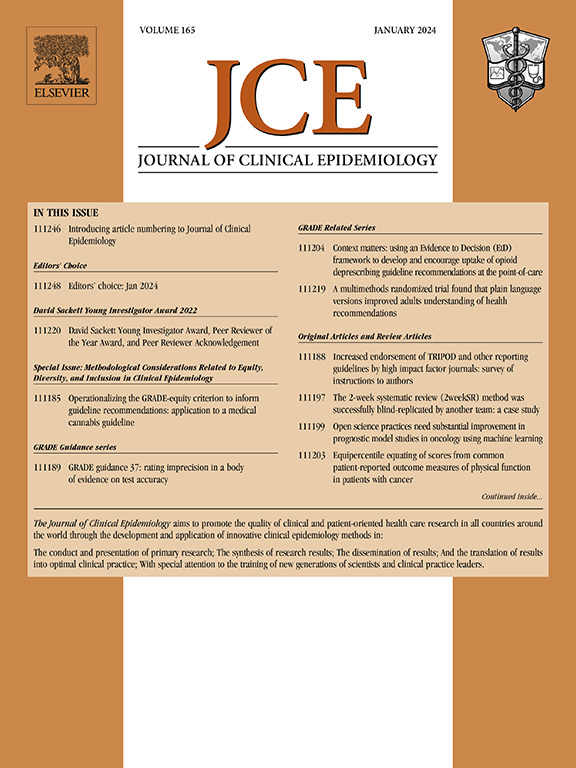Shortcomings in reporting country-level participation in multicenter randomized controlled trials involving Ireland as a collaborating partner: a metaresearch study
IF 7.3
2区 医学
Q1 HEALTH CARE SCIENCES & SERVICES
引用次数: 0
Abstract
Background and Objectives
Multi-center randomized controlled trials (RCTs) provide vital information about healthcare interventions. Reporting on country-level participation is important for understanding the context of multicenter RCTs. This study aimed to examine multicenter RCT reporting of country-level participation, using Ireland as a case study.
Study Design and Setting
This meta-research study included RCTs identified in a previous study of Irish RCTs. The previous study involved searching six databases (inception-2018) for RCTs with participants recruited in Ireland: PubMed, Embase, Scopus, CINAHL, PsychINFO, and the Cochrane Register of Controlled Trials. This current study focuses on multicenter RCTs conducted on humans in healthcare settings with <80% of participants recruited in Ireland. Outcome variables were trial characteristics and reporting rates for several variables, including the number of Irish centers, number of participants recruited in Ireland, and reporting the use of relevant reporting guidelines. Descriptive statistics were used for analysis.
Results
Overall, 239 RCTs were included. The most common intervention was a drug (74.9% of RCTs). The most common clinical domain was the cardiovascular system (18.0%). The number of Irish centers was reported in 75.3% of RCTs and the number of participants recruited in Ireland in 27.2%. Among RCTs that were published after the Consolidated Standards of Reporting in Trials (CONSORT) reporting guideline was published, 8.3% reported using a relevant reporting guideline.
Conclusion
Our findings show deficits in reporting for multicenter RCTs, particularly in reporting the number of participants in Ireland and reporting the use of relevant reporting guidelines. The development of a multicenter trial extension to existing reporting guidelines may partly address country-level reporting issues.
Plain Language Summary
A randomized controlled trial is a way of assessing the benefits of a medical intervention (like a treatment for a health issue). Randomized trials have at least two different treatment groups. The people taking part are put into one of the groups at random. This process is called “randomization” and is usually done by a computer. These trials are often conducted with people recruited from multiple countries, and Ireland is a country that sometimes plays a role. The key details about trials, such as the number of participants from each country, are often missing from publications related to trials. Information about the number of participants from each country is important, because it shows how applicable the results are to that country or similar countries. We want to find out if trials involving Ireland provide details of how many people from Ireland or how many healthcare centers in Ireland took part in the trial. We did this by looking through the researchers' main publication about the trials and seeing what information they reported. We found 239 trials published between 1968 and 2019, and among those, only 27% detailed the number of participants in Ireland. Three-quarters (75%) of the trials detailed the number of Irish healthcare centers involved. Some researchers are developing a checklist for how to report details of trials conducted across multiple countries; this may help address the shortcomings in the reporting discussed above. In general, those who fund research, publish research, regulate research, and employ researchers need to ensure there are adequate rules and incentives in place so that all relevant information about a trial is published.
求助全文
约1分钟内获得全文
求助全文
来源期刊

Journal of Clinical Epidemiology
医学-公共卫生、环境卫生与职业卫生
CiteScore
12.00
自引率
6.90%
发文量
320
审稿时长
44 days
期刊介绍:
The Journal of Clinical Epidemiology strives to enhance the quality of clinical and patient-oriented healthcare research by advancing and applying innovative methods in conducting, presenting, synthesizing, disseminating, and translating research results into optimal clinical practice. Special emphasis is placed on training new generations of scientists and clinical practice leaders.
 求助内容:
求助内容: 应助结果提醒方式:
应助结果提醒方式:


